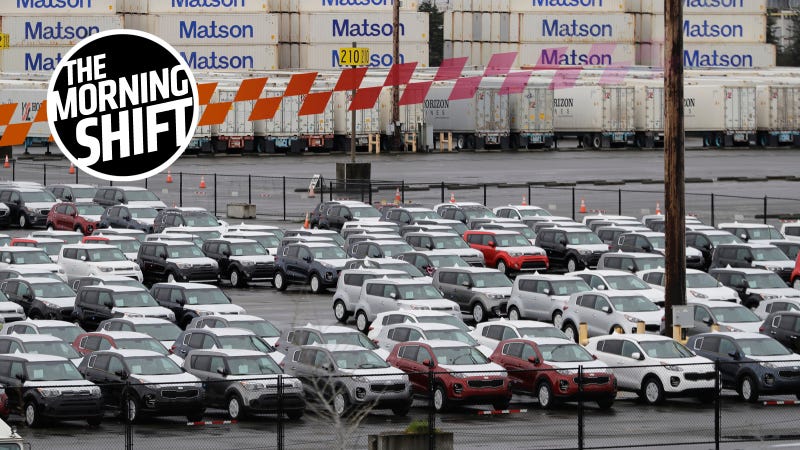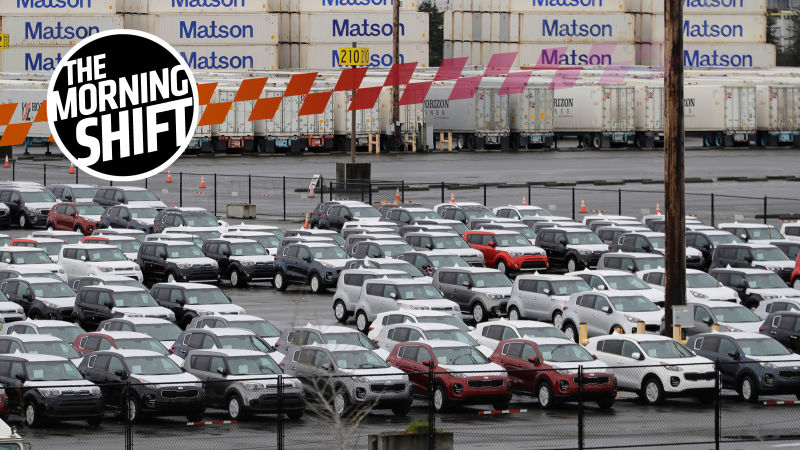
 The Morning ShiftAll your daily car news in one convenient place. Isn’t your time more important?
The Morning ShiftAll your daily car news in one convenient place. Isn’t your time more important? Big tariffs on imports could be coming on “national security” grounds, the German automakers are bracing for them, one of Tesla’s top lawyers quits and much more for The Morning Shift of Tuesday, Nov. 13, 2018.
1st Gear: National Security, Huh
Anyone who’s been following the politics around the car industry these past two years knows President Trump doesn’t think America has trade parity with other countries, and is mad in general that other nations largely don’t buy American-made cars the way we buy Asian and European ones. Never mind the fact that U.S. automakers at this point are pretty much just truck and SUV companies, and they don’t make the kinds of cars that sell in those markets. No, it’s all unfair trade policy! That’s it.
Anyway, tariffs of up to 25 percent on imported cars and parts could be on the way soon for reasons of “national security,” according to Reuters and other outlets. It’s a thin justification for tariffs but one that could, legally speaking, be shoved through the door soon. The U.S. Commerce Department has a report ready to go and everything.
Here’s Reuters:
The U.S. Commerce Department has submitted draft recommendations to the White House on its investigation into whether to impose tariffs of up to 25 percent on imported cars and parts on national security grounds, two administration officials said.
The “Section 232” recommendations on ensuring a healthy U.S. auto industry are undergoing an interagency review process and will be discussed on Tuesday at a regularly scheduled weekly meeting of the Trump administration’s top trade officials, the officials said.
The White House has pledged not to move forward with imposing tariffs on the European Union or Japan as long as it is making constructive progress in trade talks.
[…] But having the Commerce report ready for action would underscore a consistent threat from President Donald Trump – that he would impose tariffs on autos and auto parts unless the EU and Japan make trade concessions including lowering the EU’s 10 percent tariff on imported vehicles and cutting non-tariff barriers.
Trump has repeatedly suggested he would move quickly to impose tariffs, even before the Commerce Department launched its investigation in May into whether imported autos and parts pose a national security risk. The study followed closely on the heels of the imposition of similar national security tariffs on steel and aluminum.
Advertisement
Is this a garbage idea that would shellack the car industry, and one that ignores how a huge amount of “foreign” cars are built in the U.S.? Sure. But Trump doesn’t care, even though as Axios reports “Just about every member of his senior economic team besides Peter Navarro believes this is a terrible idea.”
That story notes Trump is obsessed with the idea of car tariffs, and sees it as the ultimate leverage point to get his trade partners to concede to whatever he wants, American jobs be damned, I guess.
Advertisement
There is this, as a failsafe of sorts:
Trade law dictates that Defense Sec. James Mattis must provide a national security justification for any new auto tariffs. A source who spoke to Mattis more than a month ago said he was deeply skeptical about the idea, worrying that big new car tariffs could further strain relationships with allies. Mattis has not, however, made any final decision.
A lot of people in the car business are hoping cooler heads—if there’s any left in this administration—prevail here.
Advertisement
2nd Gear: German Automakers Prepare For The Worst
The possible tariffs are the icing on the cake of a year that’s been bad news for a lot of automakers. They all face declining sales here and in China, the latter being a big problem, uncertain investors, a tightening credit market and other problems.
Here’s how the costs will be passed on to you, the consumer, Bloomberg reports:
European carmakers, despite exemptions for their output from U.S. and Mexican factories, will be hardest hit, alongside imports from Japan and South Korea, RBC Capital Markets analysts said Tuesday. Suppliers will have even more difficulties from a similar levy on parts imports, according to the bank, citing an estimate from the American Automotive Policy Council pointing to a $2,000 increase in the cost of a U.S.-manufactured vehicle and a $2,400 rise when tariffs on steel and aluminum are added.
The European Union last year shipped 1.1 million cars to the U.S., led by Volkswagen brands Audi, and Porsche, and BMW. The planned U.S. tariffs would hit autos and parts worth 58 billion euros ($65 billion), the Commission said in June, adding about 10,000 euros to the price of a European-built car.
Flaring trade tensions between the U.S. and the EU led to a temporary truce in July after Juncker met with Trump in Washington. Juncker signaled on Monday that the hiatus may only last until year-end.
Advertisement
3rd Gear: Tesla Loses a Top Lawyer
Right as it needs one as part of the Securities and Exchange Commission settlement over the most expensive tweet in history. Via Bloomberg:
Phil Rothenberg, a vice president in Tesla’s legal department, became general counsel at Sonder, a hospitality start-up, on Nov. 5, Rothenberg wrote in a message to Bloomberg News. Tesla representatives declined to comment.
Rothenberg, 48, joined Tesla in May 2011. He was previously an attorney-advisor for the U.S. Securities and Exchange Commission and has extensive securities law experience.
“It’s been a privilege to watch firsthand as Tesla grew from a niche automaker to having one of the top-selling vehicles in the U.S.,” Rothenberg wrote. “I’ll always be a supporter and believer in the company, its leadership, and its mission. I worked with Tesla to ensure a smooth transition of my responsibilities.”
In resolving fraud claims brought against Tesla and Elon Musk over the chief executive officer’s infamous tweets about trying to take the company private, the SEC required that the company hire or designate “an experienced securities lawyer” to review all social media communications made by senior officers. As another part of the agreement, the company last week replaced Musk as chairman and elevated director Robyn Denholm to the role.
Advertisement
Tesla may have turned a profit recently and continues to ramp up Model 3 production, but has struggled to keep top executives in its ranks this year.
4th Gear: You Can Soon Boast About Your Driverless Google Car Ride
Google’s Waymo is set to launch its autonomous taxi service in a small way with a handful of cars and riders in the Phoenix suburbs come December. We knew that was happening, and it’s a big deal even though the scale is very small at first.
Advertisement
But as our own Ryan Felton pointed out today, the real news is that Waymo won’t make customers who use the service sign NDAs anymore. Via Bloomberg, emphasis mine:
The first wave of customers will likely draw from Waymo’s Early Rider Program, a test group of 400 volunteer families who have been riding Waymos for more than a year. The customers who move to the new service will be released from their non-disclosure agreements, which means they will be free to talk about it, snap selfies, and take friends or even members of the media along for rides. New customers in the Phoenix area will be gradually phased in as Waymo adds more vehicles to its fleet to ensure a balance of supply and demand.
The launch of a commercial ride-hailing service will mark an end to the intense secrecy that has surrounded Waymo’s program and self-driving research in general since Google first started working on it a decade ago.
“This positions Waymo really far ahead of everyone else,” said Nick Albanese, an intelligent mobility analyst at Bloomberg New Energy Finance. “GM is the other leader, and they’re probably more than a year away from doing this. It’s very impressive.”
Advertisement
If you’re in Phoenix and you try this out, give us a shout. We’d love to hear about how it went.
5th Gear: BMW May Offload Its Credit Card
It had one? Yes, it did, apparently. Here’s one more from Bloomberg:
The automaker has held talks with banks as it considers a sale of its credit-card portfolio, according to people familiar with the matter who asked not to be identified because the discussions were private. A spokesman for BMW declined to comment.
BMW is seeking to take advantage of aggressive bidding among banks for co-brand card deals in recent years. Lenders see the cards as a lucrative way to profit from a customer’s loyalty to a certain brand or store.
BMW is one of the last major consumer companies to still own and manage its card portfolio. It would join retailers including Cabela’s and Signet Jewelers in offloading the management of their card portfolios to big banks, which already maintain the necessary compliance and customer service systems for such programs.
Advertisement
Now where am I supposed to get points for all the swag I buy?
Reverse: Still a Crazy Story Today
Advertisement
Neutral: What’s Gonna Happen With Tariffs?
Will this stuff really go into effect, or will the last remaining grown-up in the Trump Administration—whoever that is, if they even exist—make sure it doesn’t?











